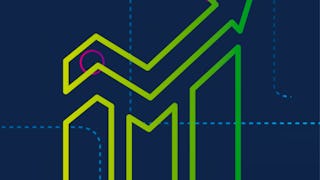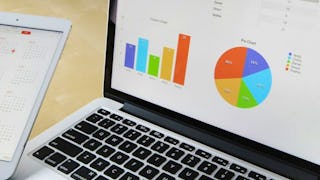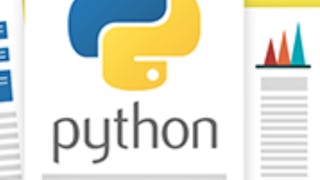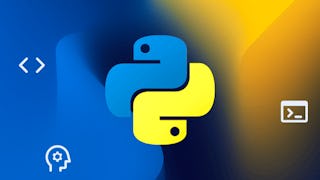- Browse
- Statistical Analysis
Results for "statistical analysis"
 Status: PreviewPreviewS
Status: PreviewPreviewSStanford University
Skills you'll gain: Descriptive Statistics, Statistics, Statistical Methods, Sampling (Statistics), Statistical Analysis, Data Analysis, Statistical Modeling, Statistical Hypothesis Testing, Regression Analysis, Statistical Inference, Probability, Exploratory Data Analysis, Quantitative Research, Probability Distribution
4.6·Rating, 4.6 out of 5 stars4.3K reviewsBeginner · Course · 1 - 3 Months
 Status: Free TrialFree TrialI
Status: Free TrialFree TrialIImperial College London
Skills you'll gain: Logistic Regression, Analytical Skills, Correlation Analysis, Regression Analysis, Sampling (Statistics), Statistical Hypothesis Testing, Data Literacy, Data Analysis, R Programming, Descriptive Statistics, Statistical Modeling, Biostatistics, Model Evaluation, Exploratory Data Analysis, Statistical Analysis, R (Software), Statistics, Statistical Methods, Data Wrangling, Public Health
4.7·Rating, 4.7 out of 5 stars2.1K reviewsBeginner · Specialization · 3 - 6 Months
 Status: NewNew
Status: NewNewIntermediate · Specialization · 3 - 6 Months
 Status: Free TrialFree Trial
Status: Free TrialFree TrialSkills you'll gain: Exploratory Data Analysis, Data Analysis, Data Import/Export, Data Manipulation, Data Transformation, Predictive Modeling, Data Cleansing, Data Preprocessing, Model Evaluation, Predictive Analytics, Pandas (Python Package), Regression Analysis, Feature Engineering, Statistical Analysis, Matplotlib, Scikit Learn (Machine Learning Library), Data Visualization, NumPy, Python Programming
4.7·Rating, 4.7 out of 5 stars20K reviewsIntermediate · Course · 1 - 3 Months
 Status: Free TrialFree Trial
Status: Free TrialFree TrialSkills you'll gain: Data Visualization, Descriptive Statistics, Regression Analysis, Forecasting, Business Analytics, Data Analysis, Statistical Analysis, Statistical Methods, Microsoft Excel, Statistics, Spreadsheet Software, Predictive Analytics, Probability
4.6·Rating, 4.6 out of 5 stars140 reviewsIntermediate · Course · 1 - 3 Months
 Status: Free TrialFree TrialU
Status: Free TrialFree TrialUUniversity of Michigan
Skills you'll gain: Statistical Hypothesis Testing, Sampling (Statistics), Statistical Modeling, Statistical Methods, Statistical Inference, Bayesian Statistics, Data Visualization, Plot (Graphics), Data Literacy, Statistics, Matplotlib, Statistical Software, Probability & Statistics, Model Evaluation, Seaborn, Statistical Analysis, Jupyter, Statistical Machine Learning, Statistical Programming, Python Programming
4.6·Rating, 4.6 out of 5 stars3.3K reviewsBeginner · Specialization · 1 - 3 Months
What brings you to Coursera today?
 Status: Free TrialFree TrialR
Status: Free TrialFree TrialRRice University
Skills you'll gain: Statistical Hypothesis Testing, Microsoft Excel, Statistical Methods, Pivot Tables And Charts, Regression Analysis, Statistics, Descriptive Statistics, Probability & Statistics, Graphing, Spreadsheet Software, Probability Distribution, Business Analytics, Statistical Modeling, Statistical Analysis, Statistical Inference, Excel Formulas, Data Analysis, Data Presentation, Model Evaluation, Sample Size Determination
4.7·Rating, 4.7 out of 5 stars13K reviewsBeginner · Specialization · 3 - 6 Months
 Status: Free TrialFree TrialG
Status: Free TrialFree TrialGGoogle
Skills you'll gain: Sampling (Statistics), Statistical Hypothesis Testing, Descriptive Statistics, Advanced Analytics, Data Analysis, Probability Distribution, Statistics, Probability, A/B Testing, Statistical Analysis, Data Science, Statistical Inference, Statistical Programming, Jupyter, Python Programming, Technical Communication
4.8·Rating, 4.8 out of 5 stars873 reviewsAdvanced · Course · 1 - 3 Months
 Status: Free TrialFree TrialD
Status: Free TrialFree TrialDDuke University
Skills you'll gain: Bayesian Statistics, Statistical Hypothesis Testing, Sampling (Statistics), Statistical Inference, Exploratory Data Analysis, Peer Review, Regression Analysis, R (Software), Statistical Reporting, Probability Distribution, Statistical Analysis, Statistics, Data Analysis Software, Data Analysis, Probability & Statistics, Probability, R Programming, Statistical Modeling, Statistical Methods, Data Visualization
4.7·Rating, 4.7 out of 5 stars7.6K reviewsBeginner · Specialization · 3 - 6 Months
 Status: Free TrialFree Trial
Status: Free TrialFree TrialSkills you'll gain: Statistical Process Controls, Statistical Hypothesis Testing, Process Improvement, Lean Methodologies, Kaizen Methodology, Process Capability, Six Sigma Methodology, Risk Analysis, Quality Improvement, Process Analysis, Statistical Analysis, Statistical Methods, Risk Management, Business Process, Sample Size Determination, Data Collection
5·Rating, 5 out of 5 stars10 reviewsIntermediate · Course · 1 - 4 Weeks

Skills you'll gain: Microsoft Excel, Excel Formulas, Spreadsheet Software, Pivot Tables And Charts, Data Analysis, Data Manipulation, Microsoft Office, Data Mining
4.7·Rating, 4.7 out of 5 stars4.6K reviewsIntermediate · Guided Project · Less Than 2 Hours
 Status: Free TrialFree Trial
Status: Free TrialFree TrialSkills you'll gain: Statistical Hypothesis Testing, Statistical Analysis, Correlation Analysis, SAS (Software), Regression Analysis, Statistical Methods, Probability & Statistics, Statistical Modeling, Plot (Graphics), Statistical Inference
4.7·Rating, 4.7 out of 5 stars175 reviewsIntermediate · Course · 1 - 4 Weeks
Searches related to statistical analysis
In summary, here are 10 of our most popular statistical analysis courses
- Introduction to Statistics: Stanford University
- Statistical Analysis with R for Public Health: Imperial College London
- Advanced Survey Design & Statistical Analysis: Coursera
- Data Analysis with Python: IBM
- Statistical Analysis Fundamentals using Excel: IBM
- Statistics with Python: University of Michigan
- Business Statistics and Analysis: Rice University
- The Power of Statistics: Google
- Data Analysis with R: Duke University
- Advanced Statistical Analysis and Tools : SkillUp
Frequently Asked Questions about Statistical Analysis
Statistical analysis is the process of collecting, examining, interpreting, and presenting data to uncover patterns and insights. It plays a crucial role in various fields, including business, healthcare, and social sciences, as it helps organizations make informed decisions based on empirical evidence. By applying statistical methods, individuals can identify trends, test hypotheses, and predict future outcomes, making statistical analysis an essential skill in today's data-driven world.
A background in statistical analysis can open doors to various career opportunities. Some common job titles include data analyst, statistician, market researcher, and biostatistician. These roles often involve analyzing data to inform business strategies, conducting surveys, or evaluating clinical trials. Additionally, positions in academia and research institutions are also available for those interested in furthering their expertise in statistical analysis.
To excel in statistical analysis, you should develop a range of skills. Key competencies include proficiency in statistical software (such as R, Python, or SAS), a solid understanding of statistical concepts (like hypothesis testing and regression analysis), and the ability to interpret and communicate data findings effectively. Familiarity with data visualization tools and techniques is also beneficial, as it helps present complex information in an accessible manner.
There are several excellent online courses available for those interested in statistical analysis. For instance, the Statistical Analysis with R for Public Health Specialization offers a comprehensive introduction to statistical methods using R. Another option is the Inferential Statistical Analysis with Python, which focuses on applying statistical techniques in Python. These courses provide valuable knowledge and practical skills for aspiring analysts.
Yes. You can start learning statistical analysis on Coursera for free in two ways:
- Preview the first module of many statistical analysis courses at no cost. This includes video lessons, readings, graded assignments, and Coursera Coach (where available).
- Start a 7-day free trial for Specializations or Coursera Plus. This gives you full access to all course content across eligible programs within the timeframe of your trial.
If you want to keep learning, earn a certificate in statistical analysis, or unlock full course access after the preview or trial, you can upgrade or apply for financial aid.
To learn statistical analysis effectively, start by identifying your goals and the specific areas you wish to explore. Enroll in online courses that match your interests and skill level, and practice regularly with real datasets to reinforce your learning. Engaging with online communities or study groups can also provide support and motivation. As you progress, consider applying your skills to projects or case studies to gain practical experience.
Statistical analysis courses typically cover a variety of topics, including descriptive statistics, inferential statistics, regression analysis, hypothesis testing, and data visualization. Additionally, many courses may introduce statistical software tools and programming languages, such as R or Python, to help learners apply statistical techniques in real-world scenarios. Understanding these topics is essential for anyone looking to build a strong foundation in statistical analysis.
For training and upskilling employees in statistical analysis, courses like the SAS Statistical Business Analyst Professional Certificate can be particularly beneficial. This program equips learners with essential skills in data analysis and statistical methods, making it suitable for professionals looking to enhance their analytical capabilities in the workplace.










